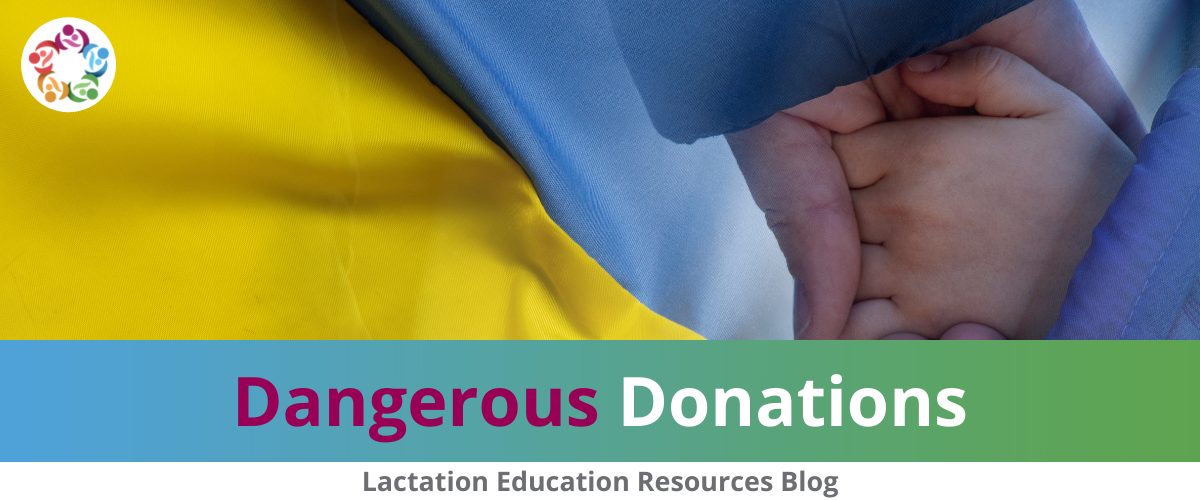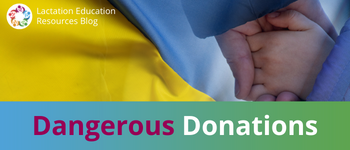Dangerous Donations


As the eyes of the world remain fastened on Ukraine, people passionate about the health of parents and babies are asking what they can do to help.
As a lactation support professional, there is one important action you can take: Educate those in your circle about the fact that donations of infant formula are not the way to help–and in fact, pose serious risks for infants and parents.
Donated breastmilk substitutes, including infant formula, other milk products, commercial complementary foods, and feeding equipment (such as bottles, teats, and breast pumps) are currently flooding into Ukraine–according to an article by Baby Milk Action/IBFAN UK. One manufacturer alone recently publicized its donation of 2.5 million CZK (about 100,000 EUR or 100,000 US dollars) worth of formula from the Czech Republic to Ukraine. And these donations are creating very real health and safety risks for babies, young children, and parents.
While targeted distribution of these products is essential to infant survival, sending breastmilk substitutes and associated products to Ukraine - or any emergency situation - outside of a coordinated relief effort knowledgeable about best practices is a bad idea. Here’s why:
- Formula donations undermine efforts to protect breastfeeding. Breastfeeding is more critical than ever during an emergency, as it provides food, hydration, immunity, and connection, as well as comfort and stress reduction for both parents and babies.
- Mass distribution of formula perpetuates the dangerous myth that lactating parents are less likely to be able to provide milk for their babies under crisis conditions. The reality: As long as parent and baby are kept together and supported to feed often, stress is very unlikely to affect milk supply.
- Donated formula may be incorrect for the age or stage of the baby who receives it, and labels may be missing or in a language the parent cannot read, leading to dangerous errors in preparation or use.
- Families who are displaced face challenges in obtaining clean water for mixing formula and in properly sanitizing bottles and teats. Babies face life-threatening risks from water-related illness, making formula use in these circumstances potentially very dangerous.
- Where formula is needed, relief organizations on the ground procure what is needed and target distribution along with supports for safer use.
Formula donations now threaten to undermine breastfeeding in Ukraine at a time when there are renewed and dedicated efforts to promote and shore up rates of human milk feeding among its people.
In Ukraine before the humanitarian conflict, breastfeeding was initiated in almost all infants - more than 95 per cent. About 20 per cent were exclusively breastfeeding at six months, and at one year, nearly 40 percent of infants still receiving some breastmilk. Lactation support - instead of unsolicited formula donations - was a significant part of the strategy for mothers and young children displaced during the conflict in eastern Ukraine, with 56 per cent still being supported to breastfeed at one year of age in 2015.
In 2014 Ukraine itself issued a strong statement asking the world not to donate breastmilk substitutes, in a statement it made with UNICEF and WHO. And in 2020, the Ukraine Ministry of Health redoubled its commitment to breastfeeding, working alongside UNICEF to pledge support for breastfeeding in public and workplace lactation practices, as well as legislative support for the WHO Code Breastfeeding support is at the heart of national family-friendly policy (unicef.org).
What About Human Milk Donations?
Educate those in your circle that human milk donations should only be sent under certain conditions:
- They are based on identified need.
- They are part of a coordinated, targeted intervention involving local medical agencies or UNICEF and including a cold chain and careful management system.
What Can Be Done Instead?
- Educate your community about the risks of formula donations and the critical importance of supporting breast/chestfeeding parents in Ukraine to continue providing their milk to their babies.
- Locate a trusted place to donate money instead–this can be the most effective way to help. UNICEF or here are good places to start.
- Consider sharing this joint statement, issued this week by UNICEF and the Infant Feeding in Emergency Core Group, within your network to further spread the word.
By accepting you will be accessing a service provided by a third-party external to https://www.lactationtraining.com/
